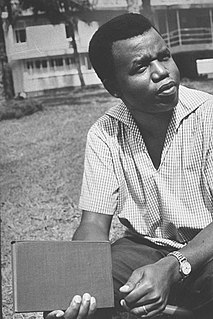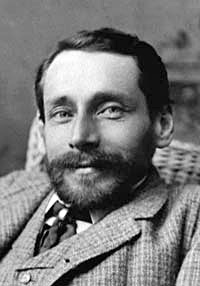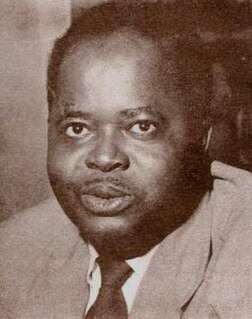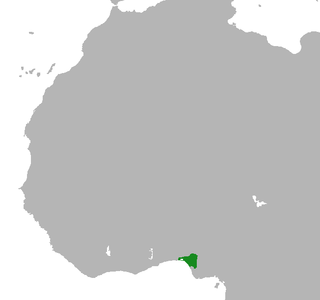Related Research Articles

German East Africa (GEA) was a German colony in the African Great Lakes region, which included present-day Burundi, Rwanda, the Tanzania mainland, and the Kionga Triangle, a small region later incorporated into Mozambique. GEA's area was 994,996 square kilometres (384,170 sq mi), which was nearly three times the area of present-day Germany, and double the area of metropolitan Germany then.

James Keir Hardie was a Scottish trade unionist and politician. He was a founder of the Labour Party, and served as its first parliamentary leader from 1906 to 1908.

Chinua Achebe was a Nigerian novelist, poet, and critic who is regarded as the dominant figure in modern African literature. His first novel and magnum opus, Things Fall Apart (1958), occupies a pivotal place in African literature and remains the most widely studied, translated and read African novel. Along with Things Fall Apart, his No Longer at Ease (1960) and Arrow of God (1964) complete the so called "African Trilogy"; later novels include A Man of the People (1966) and Anthills of the Savannah (1987). He is often referred to as the "father of African literature", although he vigorously rejected the characterization.

The Igbo people ( EE-boh, also ; also spelled Ibo and formerly also Iboe, Ebo, Eboe, Eboans, Heebo; natively Ṇ́dị́ Ìgbò In Nigeria, Igbos are indigenous to various states. Igbos are majorly found in Abia, Anambra, Ebonyi, Enugu and Imo States. A good population of Igbos are found in Delta and Rivers States while Igbos are a minority in Akwa ibom, Benue, Cross River, Edo and Kogi states. Large ethnic Igbo populations are found in Cameroon, Gabon, and Equatorial Guinea, as well as outside Africa. There has been much speculation about the origins of the Igbo people, as it is unknown how exactly the group came to form. Geographically, the Igbo homeland is divided into two unequal sections by the Niger River – an eastern and a western section. The Igbo people are one of the largest ethnic groups in Africa.
The Benin Expedition of 1897 was a punitive expedition by a British force of 1,200 men under Sir Harry Rawson in response to the ambush of a previous British party under Acting Consul General James Phillips. Rawson's troops captured and sacked Benin City, bringing to an end the Kingdom of Benin, which was eventually absorbed into colonial Nigeria.

Enugu is the capital of Enugu State in Nigeria. It is located in southeastern Nigeria. The city had a population of 722,664 according to the 2006 Nigerian census. The name Enugu is derived from the two Igbo words Énú Ụ́gwụ́ meaning "hill top" denoting the city's hilly geography. The city was named after Enugwu Ngwuo, under which coal was found. Enugwu Ngwuo is one of the ten villages that made up the Ngwuo clan, often referred to as the children of Ngwuako, the ancestral founder of the clan. Ngwuako positioned Udeneogu, his warrior son of on top of the hill (Enu-Ugwu) to protect the clan from invaders. Enugwu Ama Udeneogu, The people lived on the hilltop and farmed the sprawling surrounding valleys. Ngwuo has borders with Oshie clan in the south, Ojebeogene clan in the north and Nkanu clan in the east. The discovery of coal deposits on Enugwu Ngwuo farm lands down the valley, attracted people from all and sundry to the newly discovered wealth, in search for means of living, and as depicted in the map of the original plan for a government station, titled Enugwu Ngwo government station, this marked the core of the first urban settlement of what is today known as Enugu, started on Ngwuo land and it was called Enugwu Ngwuo until when it attained township status, the word Ngwo was removed for the convenience of pronunciation, thus a village of Ngwuo clan gave birth to a city which today has grown into a mega city, and still growing, engulfing the surrounding Nkanu towns of Nike and Akunino and stretching towards Neke and Emene.

George Mercer Dawson was a Canadian geologist and surveyor. He was born in Pictou, Nova Scotia, the eldest son of Sir John William Dawson, Principal of McGill University and a noted geologist, and his wife, Lady Margaret Dawson. By age 11, he was afflicted with tuberculosis of the spine that resulted in a deformed back and stunted growth. Physical limitations, however, did not deter Dawson from becoming one of Canada's greatest scientists.

Virginia City is a census-designated place (CDP) that is the county seat of Storey County, Nevada, and the largest community in the county. The city is a part of the Reno–Sparks Metropolitan Statistical Area.

Enugu, usually referred to as Enugu State to distinguish it from the city of Enugu, is a state in southeastern Nigeria, created in 1991 from part of the old Anambra State. Its capital and largest city is Enugu, from which the state derives its name. The principal cities in the state are Enugu, Ohum, Ezeagu, Ngwo, Nsukka, Agbani, Awgu, Aninri and Udi.
The Eastern Region was an administrative region in Nigeria, dating back originally from the division of the colony Southern Nigeria in 1954. Its first capital was Calabar. The capital was later moved to Enugu and the second capital was Umuahia. The region was officially divided in 1967 into three new states, the East-Central State, South-Eastern State. East-Central State had its capital at Enugu, which is now part of Enugu State.

Michael Iheonukara Okpara was a Nigerian politician and Premier of Eastern Nigeria during the First Republic, from 1959 to 1966. At 39, he was the nation's youngest Premier. He was a strong advocate of what he called "pragmatic socialism" and believed that agricultural reform was crucial to the ultimate success of Nigeria.

Chimaroke Nnamani is a medical doctor and Nigerian politician from Enugu State. He was elected Governor of Enugu State in the 1999 Enugu State gubernatorial election from 1999 to 2007. He subsequently served as a People's Democratic Party (PDP) Senator for Enugu East Senatorial District from 2007 to 2011 and was re-elected in 2019.

William Morris Stewart was an American lawyer and politician. In 1964, he was inducted into the Hall of Great Westerners of the National Cowboy & Western Heritage Museum.

Florence Nwanzuruahu Nkiru Nwapa, was a Nigerian author who has been called the mother of modern African Literature. She was the forerunner to a generation of African women writers, and the first African woman novelist to be published in the English language in Britain. She achieved international recognition with her first novel Efuru, published in 1966 by Heinemann Educational Books. While never considering herself a feminist, she was best known for recreating life and traditions from an Igbo woman's viewpoint.
Sir Albert Ernest Kitson, was a British-Australian geologist, naturalist, and winner of the Lyell Medal in 1927.
Zikism is the system of political thought attributed to Nnamdi Azikiwe ("Zik"), one of the founding fathers of modern Nigeria and the first democratically elected President of Nigeria. Azikiwe expanded on this philosophy through his published works such as Renascent Africa (1973) and his autobiography My Odyssey.
The mining of minerals in Nigeria accounts for only 0.3% of its gross domestic product, due to the influence of its vast oil resources. The domestic mining industry is underdeveloped, leading to Nigeria having to import minerals that it could produce domestically, such as salt or iron ore. Rights to ownership of mineral resources is held by the Federal government of Nigeria, which grants titles to organizations to explore, mine, and sell mineral resources. Organized mining began in 1903 when the Mineral Survey of the Northern Protectorates was created by the British colonial government. A year later, the Mineral Survey of the Southern Protectorates was founded. By the 1940s, Nigeria was a major producer of tin, columbite, and coal. The discovery of oil in 1956 hurt the mineral extraction industries, as government and industry both began to focus on this new resource. The Nigerian Civil War in the late 1960s led many expatriate mining experts to leave the country. Mining regulation is handled by the Ministry of Solid Minerals Development, which oversees the management of all mineral resources. Mining law is codified in the Federal Minerals and Mining Act of 1999. Historically, Nigeria's mining industry was monopolized by state-owned public corporations. This led to a decline in productivity in almost all mineral industries. The Obasanjo administration began a process of selling off government-owned corporations to private investors in 1999. The Nigerian Mining Industry has picked up since the "Economic Diversification Agenda", from Oil & Gas, to Agriculture, Mining, etc., began in the country.

The Kingdom of Benin was a kingdom in what is now in south-west Nigeria. It has no historical relation to the modern nation-state of Benin, which was historically known as Dahomey from the 17th century until 1975. The Kingdom of Benin's capital was Edo, now known as Benin City in Edo state, Nigeria. The Benin Kingdom was "one of the oldest and most developed states in the coastal hinterland of West Africa". It was formed around the 11th century AD, and lasted until it was annexed by the British Empire in 1897.
Anambra Basin is one of the energy-rich inland sedimentary basins in Nigeria. It is a nearly triangular shaped embayment covering about 3000 km2 with a total sedimentary thickness of approximately 9 km.
The Udi Hills, or Ugwueme and Udi hills, is located in the North Local Government Area of Enugu State, Nigeria. These hills rise hundreds of meters above sea level.
References
- ↑ Nigeria. University of California Press. 1960. p. 299.
- ↑ The Last Time, ebook pages pp216-226, by James Stewart Smith (Privately Published, 2019). Hardback ISBN 978-1-9164951-7-3, Ebook ISBN 978-1-9164951-8-0
- ↑ udo, R. K. (1970). Geographical Regions of Nigeria . University of California Press. pp. 196–197.